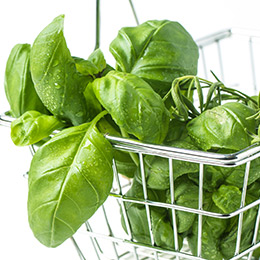Best-selling author Dr. Nancy Lonsdorf M.D. has been an Ayurvedic practitioner for more than 30 years and is recognized as one of the nation’s most prominent Ayurvedic doctors. She teaches Maharishi AyurVeda® in affiliation with the Academy of Integrative Health and Medicine and the University of Maryland School of Medicine’s Center for Integrative Medicine. A frequent speaker on national media, she continues her private practice in integrative medicine and Ayurveda, including Wellness Consultations in person or by phone.
Welcome to the “mud-luscious” and “puddle-wonderful” season of spring, to quote E.E. Cummings. Less poetically, we may find ourselves feeling a little sluggish or more congested at this time of year. Have you ever wondered why the seasons affect us in different ways?
Ayurveda offers a powerful perspective on the seasons and how they influence the supersystems that govern our bodies: larger natural cycles also influence vata, pitta, and kapha in our mind-body system.
 Seasonal Health Cycles
Seasonal Health Cycles
We know from our experience that we may be prone to different health conditions depending on the time of year: colds in fall, flu in winter, bronchitis in spring. This varies for individuals, but each season brings common influences.
This is even reflected in our language. Did you know that the English word cough comes from the Sanskrit word kapha? Not surprisingly, coughs are especially common in late winter and spring.
Ayurveda calls spring the kapha season because both the season and supersystem share the kapha qualities of heavy, moist, cool, and sluggish. Here, in the Northern Hemisphere, kapha season governs the months of March through June.
Since kapha season is a time of purification and transition, we’ll focus on some Ayurvedic tips to stay healthy and strong through this season. In doing so, we’ll expand our understanding of how the process of purification works in the body.
Since kapha season is a time of purification and transition, we’ll focus on some Ayurvedic tips to stay healthy and strong through this season.
Melting into Springtime
Ayurvedic physicians, or vaidyas, in Sanskrit, liken what happens in the human physiology during kapha season to ice melting on the mountains and flowing down into the streams and rivers in spring.
In the body, what has been “frozen” or stagnant during winter—impurities, lymphatic fluid, and mucus—starts to “melt,” soften, and move. It’s a natural time of year for purification.
As a result of this “melting” quality, the kapha supersystem or dosha, which is related to mucus, fluids, and substance in the body, also starts to move. So this is a time when we may have more mucus flowing, and explains why people prone to bronchitis may get a late-winter or spring attack of bronchitis, often in March and even into April.
7 Tips for a Healthier Spring
Since spring is the time to open all the channels that may have gotten blocked during winter, here are some key Ayurvedic recommendations for kapha season.*
 1. Lighter Foods for Better Flow
1. Lighter Foods for Better Flow
In spring, you want to have a lighter diet—less meat, less cheese, less yogurt. You might think that yogurt is light, but Ayurveda points out that anything that has been curdled has a “sticky” quality and tends to promote mucus and clog the channels of the body.
The channels of the body include all the lymphatics (which carry fluid between tissues) and the tiny capillaries—everything through which flow happens. Since all parts of the body have to be connected to the circulatory system, which brings in nutrition and carries away waste, it’s very important to keep all the channels in the body completely open.
 2. The Amazing Powers of Boiled Water
2. The Amazing Powers of Boiled Water
Boil some pure water for 5 minutes, put it in a thermos, and carry it with you to sip throughout the day. Try this for at least a month, starting any time after March 21, until the end of June, which is the end of kapha season.
Within a few days of sipping boiled water, people often find that they lose their food cravings. They start to eat lighter food naturally, start to lose weight without really trying, and don’t really feel hungry between meals.
Ayurveda says that boiling water helps it to become “lighter” and more penetrating.
Warmth also promotes peristalsis—the downward flow through the gastrointestinal (GI) tract. So boiled, warm water helps to cleanse the GI tract and move impurities down and out.
 3. The Taste of Honey
3. The Taste of Honey
You can also add some lemon and honey to your warm water, if you tolerate any kind of sweet. A little bit of raw honey can help stimulate fat metabolism, according to Ayurveda.
An important caution: Never cook honey or add it directly to boiling water. Heating honey above 95 degrees Fahrenheit can reduce its health properties and produce toxic qualities. So be sure to wait until the water is a drinkable temperature before adding the honey.
Now, you might think honey is sweet and would make you gain weight. But in Ayurveda, honey is also astringent. (This is one of the six tastes, the others being sweet, sour, salty, pungent, and bitter.) This astringent taste reduces kapha. Honey also has a “heating” effect, which stimulates fat metabolism.
 4. Color Me Green
4. Color Me Green
Another Ayurvedic recommendation is to eat more greens, especially cooked green leafy vegetables, which have a bitter quality. The bitter taste also helps to balance kapha.
Legumes are also very good for spring and kapha season. They have that astringent quality that helps to counterbalance the sweet, sour, salty, and heavy kapha qualities.
 5. Fire Up Your Digestion
5. Fire Up Your Digestion
Adding ginger and turmeric to your diet can also promote your digestive fire and spring cleansing.
The digestion tends to be weaker at this time of year. This is probably due to the massive gene flux we undergo during the season, as 4,000 genes ramp up and another 4,000 tone down their expression.**
Because of our weaker spring digestion, Ayurveda recommends eating lighter foods overall—especially in the morning and evening. Wait to eat heavier foods at lunch time, when the digestive fire is strongest.
 6. Allergy Tips
6. Allergy Tips
My recommendation for my patients who have allergies in spring is to strictly avoid any cold drinks, sugar, dairy (especially cold dairy, like ice cream), cheese, and yogurt.
When they follow this recommendation, many find that their allergy symptoms are 80 percent better. Understandably, they see this as a huge benefit.
Of course, not everyone can control their symptoms simply through diet. But it can certainly be helpful to some degree for everyone.
 7. Get Going!
7. Get Going!
Ramping up your exercise routine is another great way to increase your metabolism during kapha season.
Enjoy the warmer weather by walking outside with a friend or loved one. Go for a bike ride or take a hike and see the changing season up close. Take a class at the gym, go dancing—or just get out in the garden and dig!
For more ways to get healthier at this time of year, see my article “6 Easy Ways to Detox for Spring.”
Celebrate Spring with a Healthier Mind and Body
Kapha season brings a wonderful reprieve from the dry, cold, windy, “vata aggravating” season of winter. Spring time calms our nerves and settles our minds and bodies, while also allowing for valuable purification.
Kapha has a heavy or sluggish quality, which might have a less pleasing association for us. But it is also very important to our lives. When kapha is balanced, it gives us endurance, strength, stamina, and forbearance.
Now that spring is here, breathe deeply, get going, and follow these tips for a healthful, rejuvenating, and restorative season!
* If you have a health condition or take medication, please consult your physician before adopting any new dietary recommendations. Although unlikely, if any discomfort occurs, stop the above recommendations.
** Xaquin Castro Dopico et al, “Widespread seasonal gene expression reveals annual differences in human immunity and physiology,” Nature Communications 6, May 12, 2015.
For more information on Dr. Lonsdorf’s practice, visit www.drlonsdorf.com. To schedule an Ayurvedic Wellness Consultation by phone or teleconference, please contact Dr. Lonsdorf’s office at 641-469-3174 or healthoffice@drlonsdorf.com.
Copyright 2017, Nancy K. Lonsdorf, M.D. All rights reserved. Do not reproduce without written permission of the author.





Great info. I’ve been wanting to learn which season is associated with which dosha. Thank you!
Honey tips are sweet ones
A welcome and sensible reminder. Excellent tips.
I found this very helpful. Thank You!!